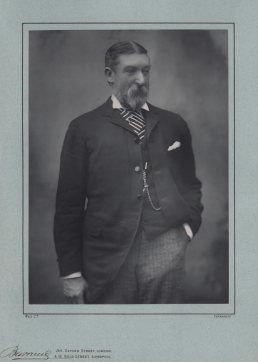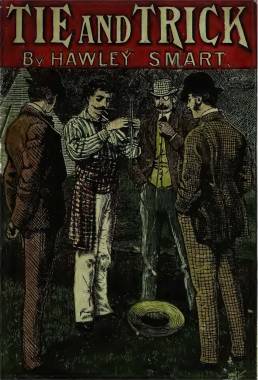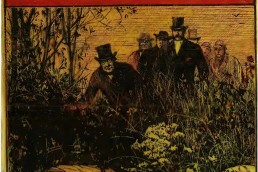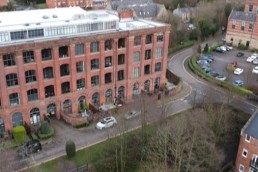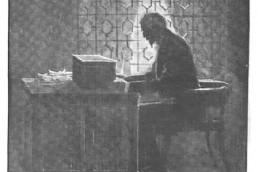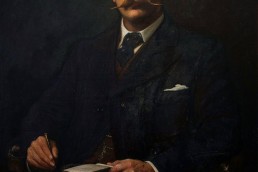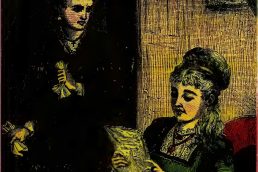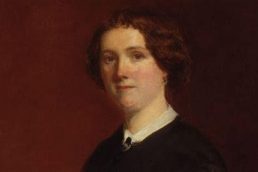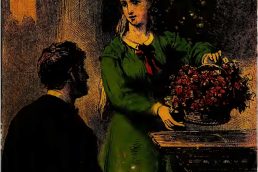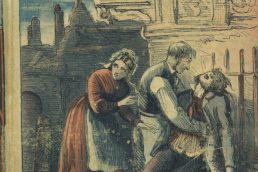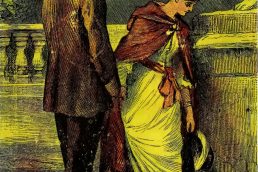Serialised fiction in the Bolton Weekly Journal - Tie and Trick (1884-85) by Hawley Smart
Hawley Smart is little-known to today’s consumer of literary fiction yet he featured in a list of, ‘The Greatest Living Englishman’ in the Pall Mall Gazette, 19th January, 1885 (p.6). There were various categories, including that of ‘Novelist’ (there was a separate category of ‘Writer’), won by Wilkie Collins (346 votes), with Thomas Hardy ninth (20 votes) and Hawley Smart with seven votes in seventeenth place. Amusingly, Victor Hugo, Thackeray, Charles Kingsley, Henry James, and Mark Twain only managed one vote each. In the category ‘The Greatest Living Englishman Humbug,’ Oscar Wilde came second, which shows the black humour of the English journalist of the period. Perhaps like me you smiled at the thought of such a modern-day tabloid style of journalism being employed by those we might usually think of as religiously, serious Victorians.
The Dictionary of National Biography, 1885-1900, has this to say of our seventeenth-place-greatest-living–Englishman-Novelist:
After education by a private tutor, he received a commission from Lord Raglan, and was gazetted ensign in the 1st regiment of foot (royal Scots) on 20 Oct. 1849, being promoted lieutenant on 6 July 1852, and captain on 15 May 1855. He served through the Crimean war, saw the fall of Sebastapol (medal and clasp and Turkish medal), returned to England in 1856, and sailed next year for India, where he served during the mutiny. In 1858 he exchanged into the 17th (Leicestershire) regiment and went out to Canada. He left Quebec in 1864, sold out of the army, and, after experiencing some losses on the turf, devoted himself to novel-writing as a profession (Seccombe, 2021).
In the opening page of Tie and Trick — serialised in the Bolton Weekly Journal (1884-85) — the narrator speaks of his hero, Fred Hambleton, as a military officer who started with a private income plus his salary but has since become a gambler, proving “the insufficiency of any moderate income, […] had for the last few years led a somewhat hand-to-mouth existence” (Smart, 1886, p.2). Clearly, Mr. Smart uses his own experiences as his inspiration and draws autobiographically, at least for the hero of this particular story.
Truth magazine of July 16th 1885 talks briefly of the novel in question: “[.…] the best of his books that I have come across. It bristles with improbabilities, but as they are represented as taking chiefly in place in Italy, the darkness of distance of the effect of the darkness of night in disposing us to credulity” (‘Letters on Books’, 1885, p.108). There is no doubt that this magazine is well-disposed toward Hawley Smart, referring to him bucking the trend for declining incomes paid to novelists by specialising in stories pertaining to matters of the Turf (i.e., horse-racing). They go on to praise his writing:
His plot is his chief concern and from the moment he commences the first line of the opening chapter, he gets fairly under weigh, dashing helter-skelter over hedges and ditches, taking the country as it comes, rattling the reader along through a succession of brisk and lively incidents, until he has brought him, in the best possible humour, to the happy consummation which ends the third volume (‘Anecdotal Photographs’, 1884. p.132).
The journalist responsible writes in such a way that we might speculate on his own ambitions to be a novelist, giving the sense of riding through the countryside on horseback which compares with the topic of narrative adopted by Hawley Smart. Yet in Tie and Trick, it appears that Hawley Smart took a change of direction by setting his story in Italy rather than on an English racecourse. It seems to have been a successful diversion, since apart from favourable reviews in Truth, we can follow his success through a Morning Post review, quoted in St. James’s Gazette of July 9th, 1885:
The author is undeniably one of the most entertaining novelists of the day. [….] Much has been sung and written on Italian brigands from ‘Fra. Diavolo’ downwards, but never has so graphic and picturesque a description of their manner of life been given as in the present book (‘New Novel by Hawley Smart’, 1885. p.4).
The author himself seems to have led an interesting and adventurous military life, having been in India, for example, at the time of the Mutiny and reached the rank of Captain and personally, having gambled his money and property to the point of poverty, before becoming an author and restoring his wealth. Based on his life, it is no surprise that his novels should be full of travel, his experiences in army life, and knowledge of gambling. I also have the impression from the reviews quoted, and feel it worth mentioning, that he may have been seen as a man’s man and perhaps his novels gained greater male favour than female.
Bibliography
Anon. (1884) Anecdotal Photographs. Truth, 24th January, pp.132-133. [Online] Britishnewspaperarchive.co.uk. Available at: <https://www.britishnewspaperarchive.co.uk/viewer/bl/0002961/18840124/051/0022> [Accessed 4 April 2021].
Anon. (1885) Letters on Books. Truth, 16th July, pp. 107-108. [Online] Britishnewspaperarchive.co.uk. Available at: <https://www.britishnewspaperarchive.co.uk/viewer/bl/0002961/18850716/051/0030> [Accessed 4 April 2021].
Anon. (1885) New Novel by Hawley Smart. St. James’s Gazette, 9th April, p. 16. [Online] Britishnewspaperarchive.co.uk. Available at: <https://www.britishnewspaperarchive.co.uk/viewer/bl/0001485/18850409/083/0016> [Accessed 4 April 2021].
Anon. (1885) Who Are the Ten Greatest Living Englishmen? The Pall Mall Gazette, 19th January, p. 6. [Online] Britishnewspaperarchive.co.uk. Available at: <https://www.britishnewspaperarchive.co.uk/viewer/bl/0000098/18850119/011/0006> [Accessed 4 April 2021].
Seccombe, T., 2021. Dictionary of National Biography, 1885-1900/Smart, Henry Hawley – Wikisource, the free online library. [Online] En.wikisource.org. Available at: <https://en.wikisource.org/wiki/Dictionary_of_National_Biography,_1885-1900/Smart,_Henry_Hawley> [Accessed 4 April 2021].
Smart, Hawley. (1886) Tie and Trick: A Melodramatic Story. London; New York: Ward, Lock and Co.
Bibliography
Colby, Robert A. (1985) “Tale Bearing in the 1890s: The Author and Fiction Syndication”. Victorian Periodicals Review. Vol.18, No.1, pp. 2-16.
Hilliard, Christopher (2009) “The Provincial Press and the Imperial Traffic in Fiction, 1870s-1930s”. Journal of British Studies. Vol.48, No.3, pp. 653-673.
Johanningsmeier, Charles (1995) “Newspaper Syndicates of the Late Nineteenth Century: Overlooked Forces in the American Literary Marketplace”. Publishing History. Vol. 37, No.1, pp. 61-82.
Jones, Aled (1984) “Tillotson’s Fiction Bureau: The Manchester Manuscripts”. Victorian Periodicals Review. Vol.17, No.1, pp. 43-49.
Singleton, Frank (1950) Tillotson’s 1850-1950: Centenary of a Family Business. Bolton: Tillotson & Son Ltd.

